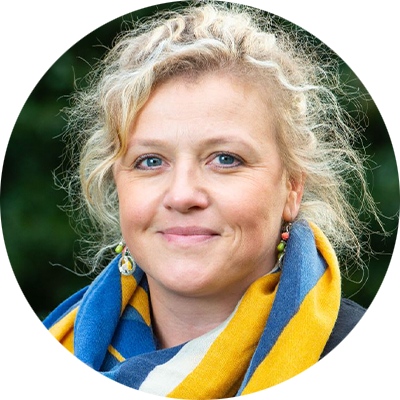Our oceans are in trouble. Microplastic waste is mounting, its effect on vital food webs is accelerating and our waters and coastal ecosystems are subject to an ever-increasing risk of exotic and invasive pests, weeds and diseases. As pressures on marine systems mount, it brings another risk not making headlines, but no less critical – biofouling. This refers to the growths that coat everything from jetties to boat propellors – tiny organisms with an enormous cost.
There is an urgent need to combat biofouling by creating new protective biofilms that help rather than harm our marine environments. Professor Sophie Leterme understands the complicated, tangled links at the core of such problems within ocean systems, and this propels her research into tackling the management of marine biofouling that affects every industry that engages with aquatic settings.
As Director of the new Australian Research Council Industrial Transformation Training Centre for Biofilm Research and Innovation based at Flinders University (which will have its official launch in November 2023), Professor Leterme leads a multidisciplinary team, with expertise in biology, microbiology, nanotechnology, chemistry, functional materials development, engineering, digital modelling and robotics. The Centre’s initial industry-focused projects will be working on the development of biofilm management solutions that are ecologically sympathetic, environmentally beneficial and economically advantageous.
“Ironically, biofouling is a microbial problem with gigantic economic ramifications,” says Professor Leterme. “Therefore, every project that the new Centre undertakes involves a mix of ecology, microbiology and chemistry. In addition to the industry partners that are at the heart of our research, the Training Centre is strongly collaborative, bringing together leading national and international researchers from Swinburne University, University of Tasmania, University of Toulon (France) and Ohio State University (USA). Being able to draw on a range of research expertise strengthens our connections with industry and makes it easier to create the multidisciplinary research teams necessary to deliver solutions to these challenging industry problems.”
Professor Leterme comes to this complex task from a background in biological oceanography. She identifies a key moment in 2010 that shaped her future research direction.
“While studying the environmental impact of a desalination plant, I came to understand the extent of problems involving the treatment of seawater, and the volume of organisms and microbes it contained that were causing fouling of the equipment,” she explains. “As I began to look at more efficient systems for reducing or removing the microbes, I came to understand how important the issue of fouling was for industry – and the massive costs it can incur.”
When her desalination projects concluded in 2015, Professor Leterme turned her attention to ocean fouling, which led her to collaborate with international and local chemists who were developing anti-fouling paints for marine environments.
International freight and naval shipping that are vital for trade and defence are severely impacted through the biofouling of ship hulls, which can increase fuel consumption by 40% due to additional hull drag and poor manoeuvrability – and this, in turn, significantly increases carbon emissions.
“The attachment of marine organisms to ships’ hulls also facilitates the translocation of these species around the globe, with invasive aquatic species threatening biodiversity and causing economic and environmental damage, especially when they become established in new habitats,” says Professor Leterme.
“Our laboratory has been working on the characterisation of biofilms on ship hulls and other marine surfaces for several years. This new Centre will train the next wave of experts to work with industry and make Australia a leader in developing and commercialising sustainable maritime platforms,” says Professor Leterme.
Through this research, she has found that this is a multifaceted problem with many intersecting elements that must be considered. “It’s not just the type of substrate we’re focusing on, it’s also the water conditions which are constantly changing – the temperature, pH levels and salinity, then also identifying the organisms in the water, from bacteria to micro-algae, to build a strong understanding of the total chemical, physical and biological composition of the water.”
The ARC Training Centre for Biofilm Research and Innovation is working with eight industry partners with an emphasis on developing biofouling management strategies for industry. It requires the team to focus on two research streams: the first examining outside surfaces, such as ship hulls, which can be fouled when introduced into water, and the second focused on problems where inside surfaces are exposed to water, such as pipes that transport water.
“We are targeting processes and management strategies to help industry better understand and control the fouling issues they have encountered,” says Professor Leterme.
Such a complex sum of possibilities requires many scientific disciplines to form new collaborations, offering valuable new perspectives. The involvement of computer modellers, for instance, enables forecasting the long-term impact of different marine conditions to understand how much impact biofouling will have on ocean vessel fuel and maintenance costs.
Explaining the far-reaching consequences of such a multifaceted project is difficult, but Professor Leterme says recent news events have underlined the importance and ramifications of this work, such as when hundreds of passengers aboard the Viking Orion were stranded off South Australia in January 2023 due to ‘marine growth’ on the hull. Professional divers were required to clean the hull at sea before the vessel was allowed to enter an Australian port.
“It was a significant talking point – because suddenly people outside of science could understand the importance of our concerns about why a cluster of mussels on the bottom of a boat can be so significant,” says Professor Leterme. “It clearly showed both the economic and social ramifications of what we are studying.”
“The attachment of marine organisms to ships’ hulls also facilitates the translocation of these species around the globe, with invasive aquatic species threatening biodiversity and causing economic and environmental damage.”
![]()
Sturt Rd, Bedford Park
South Australia 5042
South Australia | Northern Territory
Global | Online
CRICOS Provider: 00114A TEQSA Provider ID: PRV12097 TEQSA category: Australian University










